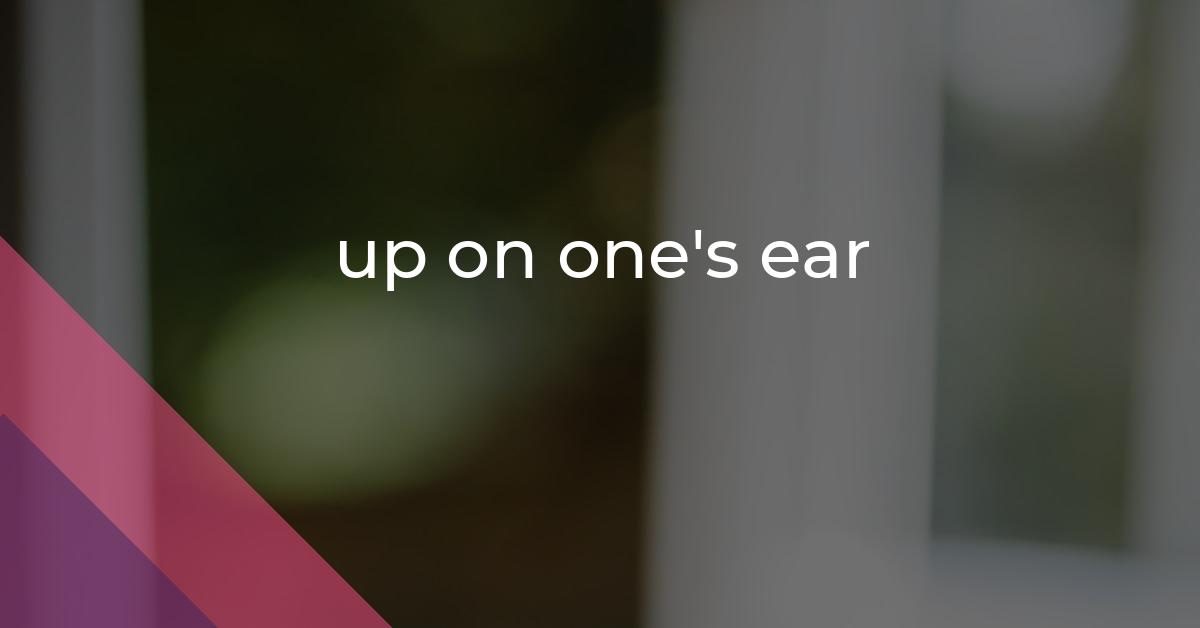up on one’s ear: Idiom Meaning and Origin
What does ‘up on one's ear’ mean?
"Up on one's ear" means to be shocked or surprised by something unexpected or unusual. It can also refer to being in a challenging or difficult situation. The idiom is often used to describe a sudden and drastic change in one's circumstances or emotions.

Idiom Explorer
The idiom "with one's jaw in one's lap" means to be extremely surprised or shocked. It implies that a person's jaw has dropped so low that it rests on their lap, emphasizing the intensity of their reaction.
The idiom "up poo creek" means being in a difficult or challenging situation, often caused by a mistake or poor decision, with no clear solution or way out.
The idiom "upon the instant" means immediately or without delay.
The idiom "up one's sleeve" means to have a secret plan or strategy, usually hidden until the right moment.
The idiom "up one's own ass" means to be self-absorbed, arrogant, and overly focused on oneself without considering or valuing others. It signifies a lack of awareness or concern for the needs or perspectives of others.
The idiom "up on" means to be knowledgeable or well-informed about a particular subject or topic.
"Up in the air" means something that is uncertain, undecided or not yet settled.
The idiom "uphill battle" means facing a difficult task or challenge that requires great effort and perseverance to overcome. It implies that progress and success will be hard to achieve due to the opposing forces or obstacles involved.
The idiom "up front" means to be honest, transparent, or straightforward. It refers to someone who is open and clear about their intentions, actions, or expectations.
The idiom "up for" means being available or willing to participate in a particular activity or event. It implies being open to considering or accepting an opportunity or challenge.
Upside-down Etymology
The idiom "up on one's ear" is a commonly used phrase in colloquial American English. It has a figurative meaning that is different from its literal interpretation. In this analysis, we will explore the origin and usage of this idiom to better understand its nuances and implications.
The exact origin of the idiom "up on one's ear" is uncertain, as there are multiple theories and no definitive evidence to support any specific claim. However, it is believed to have emerged in the early 20th century and gained popularity in American English. The idiom is related to other phrases that use body parts metaphorically to convey meaning.
The idiom "up on one's ear" describes a state of intense surprise, astonishment, or disbelief. It implies a situation where a person is caught off guard or faced with unexpected circumstances. The phrase effectively conveys a sense of being figuratively knocked over or disoriented.
When examining the metaphorical significance of the idiom, it becomes evident that being "up on one's ear" draws on the physical experience of sudden, unexpected movement. The phrase suggests a jarring disruption of one's comfort or equilibrium, similar to the disorienting sensation of being physically knocked onto one's side.
One possible explanation for the origins of the idiom relates it to the phenomena of physical imbalance and spatial disorientation. When one is unexpectedly knocked down or pushed off balance, the natural response is to regain stability by rising up from the fallen position. The phrase can be interpreted as a representation of this instinctual response. This association with physical movement adds depth to the idiom's meaning.
The usage of "up on one's ear" emphasizes the immediacy and intensity of the experience being described. It paints a vivid image of a person's emotional and physical state when confronted with surprising or shocking news. The idiom is often employed to add color and emphasis to a narrative or conversation, invoking a sense of dramatic effect.
It is important to note that "up on one's ear" is primarily used in informal contexts, such as casual conversations or storytelling. It may not be as commonly used in formal or professional settings, where more conventional language is preferred. Nonetheless, its widespread usage in everyday speech highlights its cultural relevance and acceptance among native English speakers.
While the idiom "up on one's ear" conveys a state of surprise and astonishment, it does not provide specific details about the nature of the event or circumstances that elicit such a response. This ambiguity allows for the idiom to be widely applicable and adaptable in various situations, making it a versatile linguistic tool.
The phrase "up on one's ear" is related to the idioms "believe one's ears," "up on," and "up a height." These idioms share a common thread of surprise, involvement, and being in an elevated position.
The idiom "believe one's ears" is used to express astonishment or disbelief in response to something heard. Similar to "up on one's ear," it conveys the sense of being caught off guard or experiencing a jarring revelation. While the idiom "up on one's ear" focuses on the physical and emotional reaction, "believe one's ears" specifically addresses the act of processing what is heard.
The idiom "up on" denotes being knowledgeable or informed about a particular subject. It is often used in phrases like "up on the latest news" or "up on current trends." In the context of "up on one's ear," this idiom adds a layer of involvement and engagement. Being "up on one's ear" implies being fully immersed in the surprising or astonishing situation, actively participating in the experience.
The idiom "up a height" is a British English idiom used to express extreme surprise or astonishment. It is similar to "up on one's ear" in terms of conveying a heightened state of shock or disbelief. The phrase "up a height" suggests being elevated or lifted to an extreme height as a result of the surprising event or circumstances, amplifying the intensity of the emotional and physical response.
The idiom "up on one's ear" is a commonly used phrase in colloquial American English to describe a state of intense surprise, astonishment, or disbelief. Its exact origin remains uncertain, but it is believed to have emerged in the early 20th century. The idiom draws on the physical experience of sudden, unexpected movement and effectively conveys a sense of being figuratively knocked over or disoriented. It is primarily used in informal contexts and adds color and emphasis to a narrative or conversation. Its ambiguity allows for wide applicability, and it is related to other idioms like "believe one's ears," "up on," and "up a height" that share similar themes of surprise, involvement, and elevation.
Example usage
Examples of how the idiom *up on one's ear* can be used in a sentence:
- After failing his exams, Sam's parents threatened to kick him out and send him up on his ear.
- The company went bankrupt and all the employees were sent up on their ears without warning.
- She got caught stealing at the store and was promptly sent up on her ear.
More "Expression" idioms



